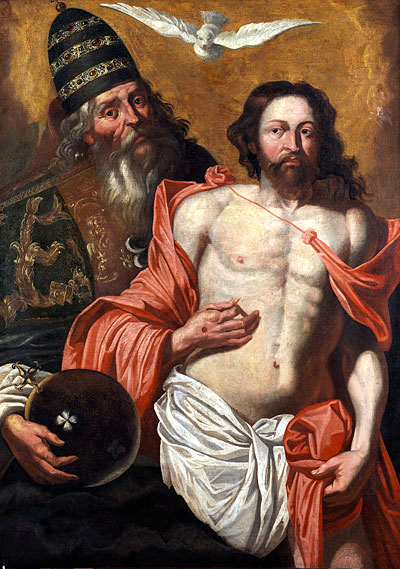Official Website of the
Catholic Diocese of Little Rock
Trinity is intimate relationship of love, trust
Published: June 1, 2023
The Solemnity of the Most Holy Trinity is celebrated each year the week after Pentecost. God has revealed himself to us as Father, Son and Holy Spirit. He is three, distinct persons in one God. The Catechism of the Catholic Church tell us this revelation is the central mystery of the Christian faith and life.
But how can God be Father, Son and Holy Spirit and still be one God? This may sound overwhelming and difficult to understand because it is.
In his 2019 homily in Vatican News, Father Antony Kadavil told a story of how St. Augustine tried to understand the great mystery of the Trinity. He was walking along a seashore when he saw a little boy pouring seawater from a shell into a small hole in the sand.
St. Augustine asked the child what he was doing. "'I am trying to empty the sea into this hole,' the boy answered with an innocent smile. 'But that is impossible, my dear child,' said St. Augustine. The boy stood up, looked straight into the eyes of St. Augustine and replied, 'What you are trying to do — comprehend the immensity of God with your small head — is even more impossible.' Then he vanished. The child was an angel sent by God to teach St. Augustine a lesson."
 But the saint didn't take that to mean that he should give up trying to know God.
But the saint didn't take that to mean that he should give up trying to know God.
"Later, St. Augustine wrote: 'You see the Trinity if you see love.' According to him, the Father is the lover, the Son is the loved one and the Holy Spirit is the personification of the very act of loving. This means that we can understand something of the mystery of the holy Trinity more readily with the heart than with our feeble mind.
"Evagrius of Pontus, a Greek monk of the fourth century who came from what is now Turkey in Asia and later lived out his vocation in Egypt, said: 'God cannot be grasped by the mind. If God could be grasped, God would not be God,'" added Father Kadavil.
"God is infinite, ever-greater than all of creation, and so we must recognize the limits of our language," wrote Father Harrison Ayre in Simply Catholic. But he cautioned against the modern idea that God "cannot be known at all by human reason."
"Though it is true that God is greater than human reason can fully comprehend, it does not mean that man can’t know things about God: i.e., that he exists, that he creates, that we can know him through creation, etc. Furthermore, the idea fails the test of faith because it forgets the idea that though there is an ever-greater difference between God and his creation, there is also a similarity: the whole of creation bears the imprint of the creator, and that this creator desires to make himself known to the world by revelation," he explained.
"In terms of human history, God has revealed his three persons to us progressively: first in the person of the Father, our Creator, then thousands of years later in the person of the Son, our Redeemer, and then finally on Pentecost in the person of the Holy Spirit," said Bishop Anthony B. Taylor in his 2021 homily.
Father Kadavil went on to detail the ways God has made himself known through the councils of Nicea and Constantinople, our creeds, the Scriptures, sacraments, the catechism, our traditions, our prayer — basically every aspect of our faith and life is in the name of the Father, the Son and the Holy Spirit.
"Modern society follows the so-called 'I-and-I' principle of unbridled individualism and the resulting consumerism," he said. "But the doctrine of the blessed Trinity challenges us to adopt an 'I-and-God-and-neighbor' principle: 'I am a Christian insofar as I live in a relationship of love with God and other people.'"
Bishop Taylor described the Trinity in a similar way. "God whose very nature is love — is a relationship. And since all relationships require another person with whom to relate, God has multiple persons at the very core of his being — he is both one and three; he could not be love, which is a relationship, otherwise. One divine nature, love subsisting in three divine persons in an intimate relationship of love and trust ..."
In 2015 he said, "The Father's love pours forth in the creation and maintenance of the world. The Son's love pours forth in his total self-sacrifice for our salvation. And the Spirit's love pours forth to strengthen us and unite us in the face of all the temptations and challenges that still lie before us. God's love is dynamic, full of power and always relational -— the source of our life, our being, our salvation and our hope of eternal life.
"Today you and I are invited to recognize that just as God is relational in the very core of his being, so also are we, since we were created by this relational God. Just as the essence of God's divine nature is love, so also — in a more limited way — the essence of our human nature is love too," the bishop added.
"And we are most fully human only when this love so characterizes each one of us that we become relational in the full sense of the term. If we invest ourselves totally in others and they in us, then this love will also be creative — to the glory of our Triune God and for the building up of his Kingdom. Our faith is not static in the least. God is doing powerful things in our world and we are given a share in his work, as well as eventually a share in his victory."




